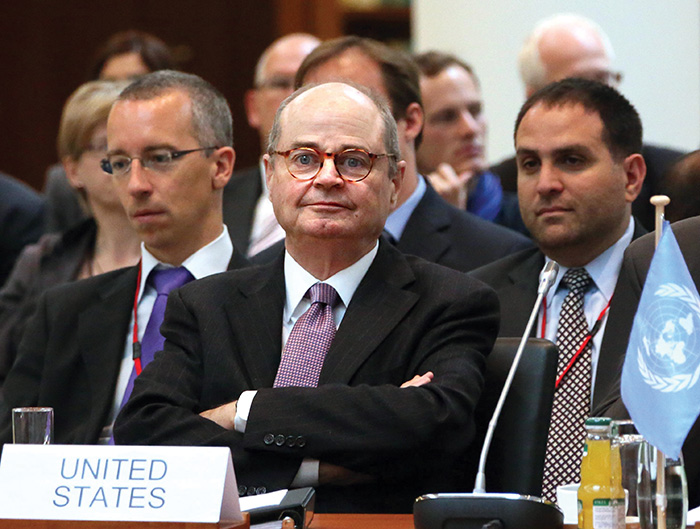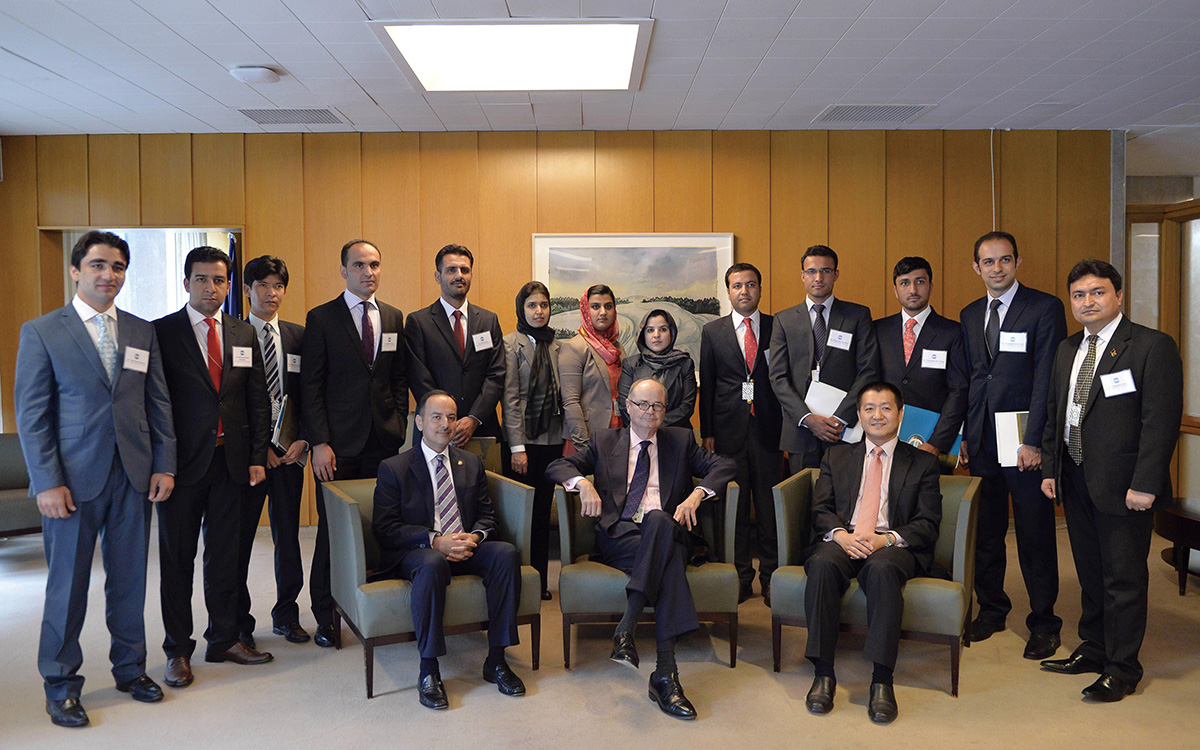Architect of Nation-Building: James F. “Jim” Dobbins, 1942-2023
BY FLETCHER M. BURTON

James Dobbins, as U.S. Special Representative to Afghanistan and Pakistan, at a conference in Berlin, Germany, in May 2013.
DPA Picture Alliance / Alamy Stock Photo
Nation-building—disavowed as a policy by Republicans and Democrats alike, sullied by failures in Afghanistan and Iraq, slighted as an overly ethnic term by European diplomats who favor “state-building,” yet honored more in the practice than in the breach after military interventions—lost its greatest explicator in James F. “Jim” Dobbins, who died on July 3 at age 81 (see also obituary on page 69).
His obituary in The New York Times hailed him as the “world’s leading authority on nation-building.” This theme wound its way through many of the tributes. Yet readers might wonder about the nation-building scoresheet.
The NYT and The Washington Post obituaries do not cite any successes except Kosovo. And in its depiction, the Post called Kosovo an “outcome celebrated by the U.S. and its allies”—a bit of sophistry, a phrasing that Vladimir Putin could easily adapt to describe his swallowing of Crimea. Further, the tributes emphasize Dobbins’ withering criticism of U.S. actions, including nation-building, in Afghanistan and Iraq. Did the leading authority leave with too few prizes?
Readers will have to turn to Dobbins’ fine memoir, Foreign Service, to find a better reckoning of successes. For example, regarding the Balkans, he asserts: Bosnia pacified, Kosovo liberated, Croatia and Serbia democratized, Macedonia and Albania stabilized. A region transformed from the smoking ruins of Yugoslavia.
What made Dobbins so thoughtful in his defense of nationbuilding was his strategic cast of mind or, more precisely, his comparative and historical approach. His many articles and op-eds invariably held up these two lenses. Thus, for instance, he would compare a country’s progress to its neighbors of similar characteristics or, using both lenses at once, to its own earlier situation. Often, though not in the case of Afghanistan and Iraq, he would conclude that nation-building in a particular country was not perfect but not bad, and certainly not without its achievements.

James Dobbins (seated, at center), then U.S. Special Representative for Afghanistan and Pakistan, poses with Minister of the Chinese Embassy to the U.S. Lu Kang (on Dobbins’ left), Afghan Ambassador to the U.S. Eklil Ahmad Hakimi (on Dobbins’ right), and young Afghan diplomats during a ceremony at the U.S. State Department in Washington, D.C., on Sept. 9, 2013.
Imago / Alamy Stock Photo
Another hallmark of his, engraved in his thinking from work in the field: a realistic yardstick for progress, a feel for constraints, a disdain for utopian standards. Consider, for example, his censure of the “democratic evangelism” in George W. Bush’s second inaugural address.
As a diplomat, as a seasoned practitioner of nation-building, Dobbins excelled in part because of his exquisite grasp of the specific evolution of a policy—for example, on the U.N. resolutions pertaining to the status of Kosovo. His legal mind could retain multitudinous details. This was useful for foiling attempts—for instance, from mischievous opposite numbers—to use obscure aspects of old documents to argue, sometimes speciously, on the issue at hand. The Sergey Lavrovs of the world had met their match.
Dobbins’ magnum opus was the RAND series he coauthored on nation-building, a formidable structure of input–output analysis. Here I can speak from personal experience. When the first volume appeared in 2003, America’s Role in Nation-Building, I was struck by the comparative and historical treatment and dazzled by the chart in the executive summary, a little graphic masterpiece of analysis involving seven countries, laid out on a time frame, from Germany to Afghanistan. After finishing the book, I resolved to spend the rest of my career in the principal countries of our nation-building: Bosnia, Kosovo, Afghanistan, and Iraq. (N.B.—And so it came to pass.)
What made Dobbins so thoughtful in his defense of nation-building was his strategic cast of mind.
My personal debt to him continued almost to his death. We corresponded over the years, chiefly on nation-building issues and more urgently from me on the looming Afghan implosion. I sent him a long appraisal of his memoir highlighting what I called its “zingers” (some of which can be found in the sidebar), and another long message on his review, sharp in its criticism but civil in its tone, of Michael Mandelbaum’s tendentious Mission Failure. Readers interested in the subject, but daunted by the multivolume RAND series, would do well to turn to that 2016 book review in The American Interest. The concluding chapter in Foreign Service, called “Reflections,” is also Dobbins in best form, a meditative “Summing Up,” as Dean Acheson titled his own last chapter in his memoirs.
After he received my comments on his memoir, Dobbins proposed lunch to discuss further. We met in Washington on Dec. 29, 2017, as my diary records:
Hosted lunch for Jim Dobbins at the Cosmos Club. We discussed his memoirs. “My image of you the memoirist, the historian”—I led off as our meal arrived, salad for him, salmon for me—“is drawn from your Petersberg chapter [negotiating the settlement in Afghanistan]: You on the hill looking down, on the city of Bonn, on your time there as the DCM at our Embassy; the historian on Olympus.” He seemed amused, or puzzled.
Toiling in the field, pondering from the mountain, working at the State Department, writing at RAND—this combination made Dobbins an authority on nation-building. Better: a builder of nation-building, an architect and sometimes critic.
When sharing or linking to FSJ articles online, which we welcome and encourage, please be sure to cite the magazine (The Foreign Service Journal) and the month and year of publication. Please check the permissions page for further details.
Excerpts from Works by James Dobbins
The whole history of Balkan diplomacy in the early 1990s demonstrated that buck passing rather than burden sharing was the default policy on both sides of the Atlantic.
—from Foreign Service, 2017
If the record of George W. Bush’s first term might be caricatured as policy without reflection, the Obama White House seemed committed to reflection without policy.
—from Foreign Service, 2017
Modern American presidents are chosen principally for what they promise to do for the economy, over which they have limited sway, rather than for how they propose to conduct foreign and defense policy, over which they have near total control.
—from Foreign Service, 2017
Nation-building is not principally about economic reconstruction; rather, it is about political transformation.
—from America’s Role in Nation-Building, 2003
It’s well past time to abandon the illusion of omnipotence and the temptation to unilateralism—bitter fruits of victory in the Cold War.
—from “American Decline? We’ve Been Here Before,” in The Wall Street Journal, 2019
Recent gains in peace and prosperity “are based on two basic, widely accepted norms of international behavior: Thou shalt not covet thy neighbor’s territory, and thou shall open thy markets to all equally.”
—from “History Ended in 1945,” in The Wall Street Journal, 2018
Invading Iraq was probably the single worst decision in the history of U.S. foreign policy.
—from a book review in The American Interest, 2016
Nation-building is difficult, costly, time-consuming and likely to disappoint. ... [S]uch missions may nevertheless sometimes prove necessary. That is why I think it so important that we learn from our experiences.
—from a book review in The American Interest, 2016
Read More...
- “A Life in Foreign Service” podcast, Amb. James Dobbins et. al, Brookings, July 2017
- “Lessons Worth Learning,” review of Foreign Service: Five Decades on the Frontlines of American Diplomacy, by Harry Kopp, The Foreign Service Journal, July-August 2017
- “In Memoriam: James Dobbins,” Policy Experts, Rand Corporation, 2023





